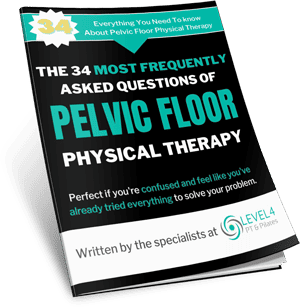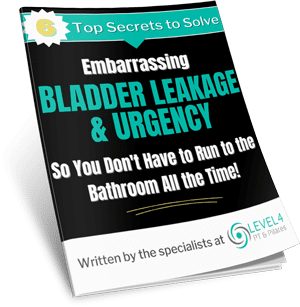
The joy of laughter is one of life’s greatest pleasures, right?
Well, not if you’re a woman who can’t control her bladder and suffers from urinary incontinence.
If that’s you, we get it. We know it’s the opposite that is true – laughing is no fun at all, and in extreme cases, the leakage that follows the simple act of laughing is so bad that you start to avoid all forms of joy.
Until everything that once brought you pleasure – like sports and exercise, brunch with your girlfriends, and sex with your partner (the things we stay alive for) become your most significant sources of stress and anxiety.
Let’s not even talk about the abject terror that washes over you and drains the blood from your face before a cough or sneeze. It’s enough to give you nightmares.
You live with constant fear. The fear of getting caught short. The shame of leaving a wet patch on the seat at your favorite bar or restaurant, or the traumatic shuffle back to your table trying to disguise your urine-soaked crotch and the fire-red embarrassment on your face.
Your relationship is crumbling under the stress of a lack of sex and intimacy, too. Your libido is non-existent, and your partner feels rejected.
They don’t get that you need to feel sexy to want sex. But wearing pads inside your lingerie or permanently wearing your “big pants,” or fearing the leakage caused by sexual arousal and orgasm, makes you feel anything but sexy.

This stuff wasn’t in your life plan either.
You have personal and professional goals, ambitions, and a desire to stay fit and healthy through exercise and staying active.
You want to run, jump, hike and swim in the ocean – to enjoy this one precious life. But it’s becoming harder and harder to live that lifestyle when you can’t control your bladder.
All you want to do is stay home – close to the toilet, pads, and a change of pants. It’s hard not to get down about it. You didn’t think this sort of stuff happened until well into old age.
It’s not something we talk about with our girlfriends. We joke and skirt around the subject, of course, but in severe incontinence cases and not controlling your bladder, we don’t want to share.
But the critical thing to remember is you’re not alone. It happens to all types of women. But you don’t have to endure it.
In this blog, we discuss some of the reasons you might not control your bladder and explain what to do about it and how to treat it.
What Is Wrong With My Bladder?

Living with a weak bladder is inconvenient and distressing. If you are continuously leaking urine when you do things like laugh, cough, jump, or sneeze, or you can’t seem to control your urine flow, you don’t have to live with it.
Urinary incontinence is a widespread problem. Women suffer from it at all ages – most likely after childbirth or during perimenopause and menopause. But it can happen at any age and when you haven’t had children.
It’s certainly not limited to women from retirement age and onwards. This assumption is a common misconception.
But the good news is we can treat it at any age. You don’t have to suffer in silence.
There are medical reasons for your loss of bladder control. Here’s a clear, simple explanation for why you can’t control your bladder and the range of treatments available.
What Is Urinary Incontinence?

When you cannot control your bladder and are leaking large or small amounts of urine, you probably suffer from urinary incontinence or an overactive bladder.
Women often think urinary incontinence happens because they drink too much liquid. It doesn’t. It occurs due to a problem in your body, so it is always essential to see your doctor if you think you have urinary incontinence.
In a large proportion of cases, the problem’s source is to do with your pelvic floor muscles not working properly.
However, it’s not always the case, so it’s important to talk to your doctor or Physical Therapist to determine the source of the problem.
Symptoms of Urinary Incontinence:
When finding it hard to control your bladder, you may experience any of the following symptoms:
- Leaking urine when you laugh, sneeze, exercise or cough.
- An unexpected, powerful urge to urinate that you cannot control results in leakage before getting to the toilet.
- Some women may also experience spasms in the pelvic region, bedwetting, or a continuous need to go to the bathroom more than eight times in 24 hours.
Causes of Loss of Bladder Control:
One of the most common causes is the lack of communication between your bladder, your pelvic floor muscles and your brain.
The pelvic floor muscles may or may not be weak. Still, we often find they are not communicating well when you get the urge to urinate and can become a problem over time if not resolved.
Being aware of how to contract and relax the muscles properly can work like any other muscle in your body. Sometimes, it needs some guidance to get it working properly. Sometimes this happens after pregnancy, during menopause, or even at other times in a woman’s life.
In some cases, the open gateway results in problems with the nerves in the bladder or urethra. Other causes can be a loss of bladder control due to extra pressure on the bladder or pelvic floor muscles due to weight gain, chronic constipation, medicines, high caffeine intake, and infection.
With the path through the urethra left open, you experience an unexpected, urgent need to urinate that results in leakage.
If you are a woman, you are twice as likely to suffer from urinary incontinence as men.
The strain during pregnancy, the way the pelvic floor muscles lose strength during menopause, and the shorter pathway of the female urethra make women more susceptible to an overactive bladder than men.
If you are an older mother, you have double the chance of suffering from incontinence. However, don’t be alarmed. There are several treatments available.
 Types of Urinary Incontinence
Types of Urinary Incontinence
There are four types of urinary incontinence that affect your ability to control your bladder, and you might find you have a combination of more than one.
- Stress incontinence is a prevalent form of urinary incontinence, particularly for new moms and women going through menopause. The extra strain from pregnancy – on the bladder and urethra, or just the passage of time causes weakened pelvic floor muscles. Which, in turn, causes urine to escape when you do things like laughter, exercise, or sneeze.
- Urge incontinence: Older women most often experience urge incontinence. It involves feeling an unexpected, powerful need to wee after a glass of water, hearing running water, during sleep, and more. In most cases, nothing much comes out when you use the toilet. You might leak before you get to the toilet, or it may be a feeling you experience more than eight times in 24 hours.
- Total incontinence is when your bladder is unable to retain any urine for any length of time.
- Overflow incontinence occurs when your bladder never fully empties, so trickles of urine leak out continuously or once you have finished weeing.
How to Treat Loss of Bladder Control?
In many cases, the treatments for urinary incontinence are surprisingly simple but don’t try to self-diagnose. The diagnosis part is complex. Urinary incontinence is usually an outcome of a problem somewhere else in the body – not directly associated with the bladder. There are many different types of urinary incontinence, too, each with its specific treatment.
You need a professional. The wrong treatment could cause more problems, so it is essential to see your MD or a Physical Therapist if you’re struggling to control your bladder.
 Bladder Control: Treatments
Bladder Control: Treatments
Some of the most prevalent urinary incontinence treatments include:
Strengthening pelvic floor muscles: it is possible to improve the function of pelvic floor muscles by doing specific pelvic floor exercises, called Kegel exercises. It is also essential to learn how to properly relax the muscles, as well.
These exercises involve tightening the pelvic floor muscles that can mimic the feeling you get when you pass urine and holding them for about 4 seconds before re-releasing them.
The releasing part is very important to let go, and learn the difference between the two. This is not good to practice when you are actually on the toilet, though.
Then repeat for 10. If you pretend to pee, hold it in, then you’ll feel the muscles you need to work.
These exercises are straightforward to do. Do them three times a day and no more.
You’ll find you can conveniently perform them out at work, when you’re in the car or while relaxing on the sofa.
Retraining your bladder: Train your bladder to retain higher volumes of urine by scheduling your trips to the bathroom. Write down how often you go to the toilet over a series of days. Next, create a 24-hour timetable for your bathroom visits with an extra 15-minute break between each trip.
Make sure you go to the toilet according to the schedule and try to urinate each time, even if you don’t feel like it.
Other treatments: Weight loss, drinking less caffeine, fizzy drinks or alcohol, and stopping smoking are other treatments for incontinence.
However, the #1 most effective treatment for urinary stress incontinence and a loss of bladder control is to see a specialist that treats this condition, call a pelvic floor physical therapist.

Our Integrative Wellness Center in Encinitas specializes in Women’s Health. We want women over 40 to thrive, not just survive.
So, whether it’s bladder function and urinary stress incontinence you need help with, or it’s something else – like postnatal back pain, painful sex, or diastasis recti. We’re here to support you and help fix your issues so you can get back to living a full and adventurous life.
We specialize in finding the root cause of your bladder control problems – to treat it and stop it from returning. Kegels and bladder training are only part of the solution. But they aren’t the total solution, and they’re unlikely to work in isolation to fix your problems. We need to find the root cause.
What are you waiting for? Get help now.
Contact Us to book your complimentary call with one of our Women’s Health specialists or try a free 30-minute taster session.
- 3 Proven Ways You Can Relieve Sciatic Pain While Sleeping - September 14, 2023
- Menopause and the Impact It Can Have On Your Weight - August 4, 2023
- 5 Ways That Pilates Can Help With Back Pain - July 19, 2023


















